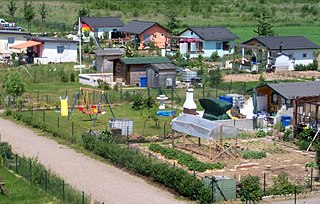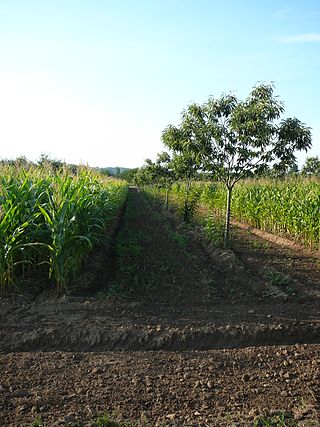Related Research Articles

An allotment, a type of community garden, is a plot of land made available for individual, non-commercial gardening for growing food plants, so forming a kitchen garden away from the residence of the user. Such plots are formed by subdividing a piece of land into a few or up to several hundred parcels that are assigned to individuals or families. Such parcels are cultivated individually, contrary to other community garden types where the entire area is tended collectively by a group of people. In countries that do not use the term "allotment (garden)", a "community garden" may refer to individual small garden plots as well as to a single, large piece of land gardened collectively by a group of people. The term "victory garden" is also still sometimes used, especially when a community garden dates back to the First or Second World War.

Community-supported agriculture or cropsharing is a system that connects producers and consumers within the food system closer by allowing the consumer to subscribe to the harvest of a certain farm or group of farms. It is an alternative socioeconomic model of agriculture and food distribution that allows the producer and consumer to share the risks of farming. The model is a subcategory of civic agriculture that has an overarching goal of strengthening a sense of community through local markets.

Sharecropping is a legal arrangement in which a landowner allows a tenant (sharecropper) to use the land in return for a share of the crops produced on that land. Sharecropping is not to be conflated with tenant farming, providing the tenant a higher economic and social status.

Urban agriculture refers to various practices of cultivating, processing, and distributing food in urban areas. The term also applies to the area activities of animal husbandry, aquaculture, beekeeping, and horticulture in an urban context. Urban agriculture is distinguished from peri-urban agriculture, which takes place in rural areas at the edge of suburbs.

Agroforestry is a land use management system that integrates trees with crops or pasture. It combines agricultural and forestry technologies. As a polyculture system, an agroforestry system can produce timber and wood products, fruits, nuts, other edible plant products, edible mushrooms, medicinal plants, ornamental plants, animals and animal products, and other products from both domesticated and wild species.

Guerrilla gardening is the act of gardening – raising food, plants, or flowers – on land that the gardeners do not have the legal rights to cultivate, such as abandoned sites, areas that are not being cared for, or private property. It encompasses a diverse range of people and motivations, ranging from gardeners who spill over their legal boundaries to gardeners with a political purpose, who seek to provoke change by using guerrilla gardening as a form of protest or direct action.

A community garden is a piece of land gardened or cultivated by a group of people individually or collectively. Normally in community gardens, the land is divided into individual plots. Each individual gardener is responsible for their own plot and the yielding or the production of which belongs to the individual. In collective gardens the piece of land is not divided. A group of people cultivate it together and the harvest belongs to all participants. Around the world, community gardens exist in various forms, it can be located in the proximity of neighborhoods or on balconies and rooftops. Its size can vary greatly from one to another.
Uran gardening is the practice of growing vegetables, fruit and plants in urban areas, such as schools, backyards or apartment balconies.

Organopónicos or organoponics is a system of urban agriculture using organic gardens. It originated in Cuba and is still mostly focused there. It often consists of low-level concrete walls filled with organic matter and soil, with lines of drip irrigation laid on the surface of the growing media. Organopónicos is a labour-intensive form of local agriculture.

Over the centuries the roles of rivers as part of the city has altered many times from the original use for the irrigating crops in nearby fields, as well as being an essential resource in establishing a permanent settlement. However, when the industrial revolution took place in the 19th century the role of the rivers in cities altered and it became a far more valuable resource as it allowed not only for the transportation of goods from town to town but also became the basis for the expansion and improvement of the trading prowess of the city. This transportation of goods was done through the construction of a canal network spreading across the country which tamed the rivers sufficiently and so therefore allowed for the movement of goods such as coal to move from place to place. Furthermore, after the advancement of the railway network which now took over most of the movement of goods throughout the country, this left the rivers and canals of Britain without a role in Britain’s transport network. This allowed areas of the canal and river networks to become polluted through chemical waste and public misuse, which caused difficulties for the animals for which the river and its surrounding wetlands and marshes were their natural habitats. Yet since the 1950s there has been a dramatic increase in the number of riverside developments which have not only brought increased money into the area but have also redeveloped and enhanced the natural environment and increased the aesthetic qualities of these areas on the whole.

The traditional kitchen garden, vegetable garden, also known as a potager or in Scotland a kailyaird, is a space separate from the rest of the residential garden – the ornamental plants and lawn areas. It is used for growing edible plants and often some medicinal plants, especially historically. The plants are grown for domestic use; though some seasonal surpluses are given away or sold, a commercial operation growing a variety of vegetables is more commonly termed a market garden. The kitchen garden is different not only in its history, but also its functional design. It differs from an allotment in that a kitchen garden is on private land attached or very close to the dwelling. It is regarded as essential that the kitchen garden could be quickly accessed by the cook.

Urban horticulture is the science and study of the growing plants in an urban environment. It focuses on the functional use of horticulture so as to maintain and improve the surrounding urban area. Urban horticulture has seen an increase in attention with the global trend of urbanization and works to study the harvest, aesthetic, architectural, recreational and psychological purposes and effects of plants in urban environments.
Denver Urban Gardens (DUG) is a non-profit organization that supports community gardens in Denver, Colorado in the United States.

The terms transition town, transition initiative and transition model refer to grassroot community projects that aim to increase self-sufficiency to reduce the potential effects of peak oil, climate destruction, and economic instability through renewed localization strategies, especially around food production and energy usage. In 2005, the founding of Transition Town Totnes in the United Kingdom became an inspiration for other groups to form. The Transition Network charity was founded in early 2007, to support these projects. A number of the groups are officially registered with the Transition Network. Transition initiatives have been started in locations around the world, with many located in the United Kingdom and others in Europe, North America and Australia. While the aims remain the same, Transition initiatives' solutions are specific depending on the characteristics of the local area.

Community gardens in the United States benefit both gardeners and society at large. Community gardens provide fresh produce to gardeners and their friends and neighbors. They provide a place of connection to nature and to other people. In a wider sense, community gardens provide green space, a habitat for insects and animals, sites for gardening education, and beautification of the local area. Community gardens provide access to land to those who otherwise could not have a garden, such as apartment-dwellers, the elderly, and the homeless. Many gardens resemble European allotment gardens, with plots or boxes where individuals and families can grow vegetables and flowers, including a number which began as victory gardens during World War II. Other gardens are worked as community farms with no individual plots at all, similar to urban farms.

Foodscaping is a modern term for integrating edible plants into ornamental landscapes. It is also referred to as edible landscaping and has been described as a crossbreed between landscaping and farming. As an ideology, foodscaping aims to show that edible plants are not only consumable but can also be appreciated for their aesthetic qualities. Foodscaping spaces are seen as multi-functional landscapes that are visually attractive and also provide edible returns. Foodscaping is a method of providing fresh food affordably and sustainably.

Urban agriculture in West Oakland involves the implementation of Urban agriculture in West Oakland, California.

A community orchard is a collection of fruit trees shared by communities and growing in publicly accessible areas such as public greenspaces, parks, schools, churchyards, allotments or, in the US, abandoned lots. Such orchards are a shared resource and not managed for personal or business profit. Income may be generated to sustain the orchard as a charity, community interest company, or other non-profit structure. What they have in common is that they are cared for by a community of people.
Gateway Greening is non-profit organization based in St. Louis, Missouri that works to educate and empower the community through gardening and urban agriculture. The organization operates demonstration and community resource gardens and an urban farm, hosts lectures and education programs, and supports school and community gardens throughout the City and St Louis County, Missouri.
Keep Growing Detroit is an organization dedicated to food sovereignty and community engagement in the cities of Detroit, Hamtramck, and Highland Park. Founded in 2013, the program designs and implements initiatives that promote the practice of urban agriculture as a mode of food justice for underrepresented communities, particularly those who do not have access to healthy food options. The goals of Keep Growing Detroit are to educate and empower community members using urban agricultural practices. Programs such as the Garden Resource Program and Grown in Detroit served as catalysts, laying the foundation for Keep Growing Detroit.
References
- 1 2 Garden-sharing program bears fruit The Star, July 10, 2009
- ↑ Like an eager vine, urban garden sharing spreads its roots The Oregonian, June 04, 2009
- ↑ "Growing Relations" Urban Garden Share, US
- ↑ The Sharing Solution by Emily Doskow, Janelle Orsi pp. 259-262 (Nolo, 2009)
- ↑ "Sample agreements: Pro forma templates" Archived 2010-03-29 at the Wayback Machine Landshare, UK
- ↑ Grassroots garden sharing scheme blooms thisisbath.co.uk (The Bath Chronicle). May 27, 2009.
- ↑ Saving the planet, one block, one small project at a time by Mary Rothschild. Seattle Times. August 10, 2009.
- ↑ Harrison, Linda (2 September 2011). "Garden sharing: growing your own vegetables on someone else's patch". The Guardian. Retrieved 14 December 2016.
- ↑ Garden sharing scheme to fight credit crunch Archived 2011-01-06 at the Wayback Machine . thisislincolnshire.co.uk (Lincolnshire Echo). March 21, 2009.
- ↑ Landshare Archived 2009-07-25 at the Wayback Machine , in conjunction with public-service broadcaster Channel 4.
- ↑ "Preter son Jardin" . Retrieved 1 October 2014.
- ↑ Transition Town Totnes Garden Share Project Archived 2009-07-20 at the Wayback Machine is part of the Transition Towns initiative in Totnes, Devon, England.
- ↑ Transition: gearing up for the great power-down by Luke Leitch. TimesOnline (The Times). November 17, 2008.
- ↑ Garden scheme to grow food (video) BBC News. Monday, 13 October 2008.
- ↑ Berry, Michael (August 12, 2009). "Local food advocates seek Aoraki links". The Timaru Herald . Retrieved September 30, 2011.